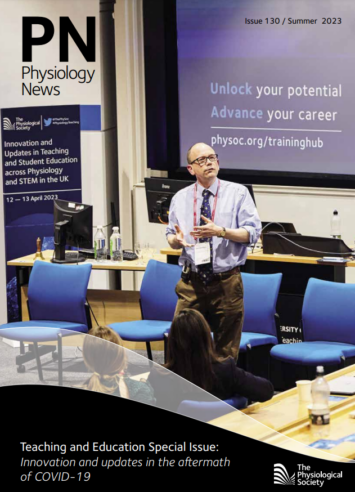
Physiology News Magazine
Developing a bespoke e-workbook
News and Views
Developing a bespoke e-workbook
News and Views
https://doi.org/10.36866/pn.130.17
Dr Matthew F. Jacques, Dr Paul S. Harlow, & Natasha Noel-Barker
University of Nottingham, UK
Textbooks and related core reading have long been a staple tool for staff delivering a learning resource for students in higher education, providing a fundamental source of information (Waller, 2013). However, for students, staff and institutions alike, hard copy textbooks are expensive and environmentally unfriendly (Kingkade, 2013). In addition, much debate remains around the efficacy and effectiveness of textbooks in a digital age (Lynch and Ratto, 2012), with Grensing-Pophal (2010) stating “higher education must position itself to be ready to incorporate e-books effectively”.

Textbooks vs e-books
Online e-books have become increasingly utilised by many UK academic libraries (Casselden and Pears, 2020); however for many staff, it can be difficult to find a single textbook of reference that encompasses content for an entire module. Students might have to access multiple textbooks/ebooks for a single module, which could be confusing. Although it is common practice to direct students to various chapters from an array of books for further reading, it could be considered as passive learning. In an evolving world of interactive learning tools, flipped classrooms, team and problem-based learning, a more active and student-centred approach to learning should be considered.
How to support student learning?
Xerte is an open-source software developed at The University of Nottingham, primarily for creating interactive learning content. To date, Xerte has been primarily used in the development of single-topic learning resource (Sait and Tombs, 2021). However, it has been proposed that it could be used as an e-workbook, whereby it can be integrated within the virtual learning platform, providing a more active learning approach for students. The development of a bespoke e-workbook would allow for relevant content only to be included, avoiding potential issues surrounding access to external sites and reducing costs for students.
The development of a Xerte e-workbook allows the authors to develop written content as a resource for students, in line with their specific module content, and avoid any potential issues of multiple textbooks being used or potential student expenses. In addition, along with core written content, the Xerte package allows the development of multiple choice questions, problem-based learning, and even allows students to write and view model answers; these are just a few of the benefits. The use of these interactive activities means that real-time information related to students’ knowledge, or skill-set, can be monitored, and feed-forward in to future teaching. Furthermore, higher level skills can also be developed by an e-workbook by directing students to specific journal articles with instructions related to reporting findings or mechanistic explanations.
Evaluating students’ perceptions
We are currently undertaking a pedagogical research study to evaluate student perceptions, engagement and effectiveness of an e-workbook. Students completed the first half of the academic year with no e-workbook available to them, acting as a control condition. In the second half of the academic year, all students were given access to an e-workbook, which has been integrated into the virtual learning platform with specific content placed next to lecture content. Students’ exam performance, engagement and perceptions of the E-Workbook are all being used to assess its use.
Thus far, students have anecdotally reported enjoying the use of the e-workbook, identifying its interactive features, directed learning and placement within the virtual learning platform as key benefits. We look forward to further exploring the impact of this approach and how it could support student learning.
References
Casselden B, Pears R (2020). Higher education student pathways to ebook usage and engagement, and understanding: highways and cul de sacs. Journal of Librarianship and Information Science, 52, 601-619.
Grensing-Pophal L (2010). Are textbooks obsolete? An education in the impact of electronic textbooks. EContent (Wilton, Conn.), 33.
Kingkade T (2013). College textbook prices increasing faster than tuition and inflation. The Huffington Post.
Lynch A, Ratto B (2012). Undergraduate student perceptions of a free textbook alternative. Business Education & Accreditation, 4, 25-32.
